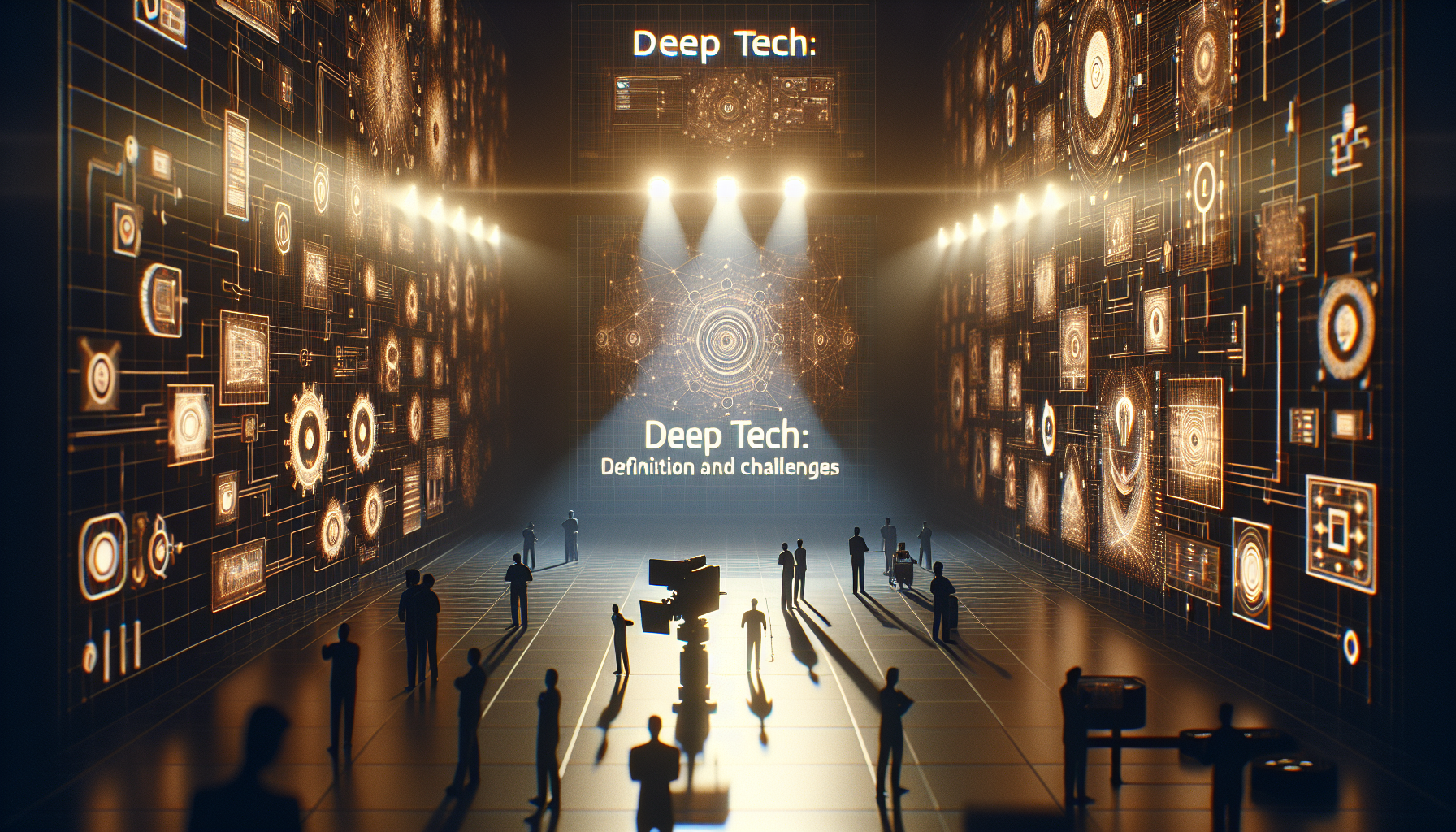There Deep Tech, or cutting-edge technology, represents a revolution in the world of startups and innovation today. It stands out from more conventional technologies by the depth of its changes and its disruptive potential.
But what do we really mean by Deep Tech, and how is it different from other types of technology?
Definition of Deep Tech
The term Deep Tech refers to technologies that are based on significant scientific discoveries or engineering advances. These technologies are generally characterized by their highly innovative aspect, their complexity and often, a long maturation period before they can be commercialized.
The sectors associated with Deep Tech encompass a variety of areas such as:
- Artificial intelligence (AI) and machine learning
- Biotechnology and life sciences
- New materials and nanotechnologies
- Robotics and drones
- Clean energy and environmental technologies
- Quantum information processing
These technologies often require significant investments, in time and capital, to cross the technological “valley of death”, which is the critical phase between proof of concept and bringing a viable product to market. This is one of the reasons why startups Deep Tech are regularly the subject of significant financing and support from specialized investors.
Difference between deep tech and other technologies
What distinguishes the Deep Tech other innovations is that it does not simply build on existing technologies, but seeks to create new foundations for the future based on substantial scientific advances. The ambition of the Deep Tech lies in its potential to have a lasting and significant impact on the way we live and interact with the world around us.
The strength of the Deep Tech is therefore its ability to project itself beyond the iteration of what already exists, thus directing investments towards radical innovations which may take time to materialize but whose impact can be monumental.
Emblematic examples of Deep Tech
In the context of the Deep Tech, several examples perfectly illustrate the scope and diversity of these technologies:
- Elon Musk and his company SpaceX: revolutionizing the space industry with reusable rockets.
- CRISPR-Cas9: a genetic modification technology that could transform medicine.
- The autonomous car developed by companies such as Waymo (Alphabet subsidiary) or You’re here.
- Efforts in the nuclear fusion energy sector, with startups like Commonwealth Fusion Systems who seek to make fusion energy a reality.
It is essential to understand that the Deep Tech is more than just a trend; it is a paradigm shift that defines new frontiers of what is possible, and opens the way to a future where innovation means substantial progress.
The Distinctive Characteristics of Deep Tech Companies

Massive commitment to Research and Development (R&D)
One of the very important characteristics of Deep Tech companies is their substantial investment in R&D. They dedicate a large part of their resources, both financial and human, to the exploration and development of advanced technological solutions. This level of commitment ensures continuous innovation and keeps the company at the forefront of technology.
Contribution to scientific advances
Unlike traditional technology companies, Deep Tech companies often originate from or are closely linked to scientific advances. They are generally based on principles and discoveries discovered in research laboratories and require an in-depth understanding of fields such as artificial intelligence, biotechnology, robotics, or aerospace.
Collaborations with the academic world
Deep Tech companies maintain close collaborations with universities and research centers. These partnerships allow them to directly access the latest research and talent in their field. In addition, it facilitates the transfer of technology from the laboratory to the market.
Long development cycles
The products and services developed by Deep Tech companies often involve disruptive technologies that require long maturation periods. We therefore notice prolonged development cycles, during which these companies must demonstrate patience and persistence before reaching the commercialization of their innovation.
High risk and high reward potential
Deep Tech companies are associated with significant risks. Indeed, the investments necessary for the maturation of technologies can be enormous, with no guarantee of immediate success. However, the potential for returns is also high, with the potential to transform entire industries and create new market categories.
Access to specialized capital
The complex nature of Deep Tech technologies requires investors who understand the challenges inherent in the field. This is why access to specialized venture capital funds is crucial. These not only offer financial support but also expertise and a network which can be decisive for the growth of the company.
Robust intellectual property
Strong intellectual property is a cornerstone of Deep Tech companies. To protect their technology and investments, these companies must have a strong patent portfolio. This gives them a competitive advantage and allows them to operate in a market that is often less saturated.
Multidisciplinary teams
The innovative nature of Deep Tech companies requires varied skills. Thus, they bring together professionals from various disciplines (scientists, engineers, data specialists, business experts, etc.) to meet the complex challenges inherent in the development of cutting-edge technologies.
Contribution to solutions to major global challenges
Deep Tech companies often aim to respond to major challenges such as climate change, global health or food security. They aspire to have a significant societal impact through their innovations, thus contributing to a better future.
Focus on sustainability
Being at the forefront of innovation, Deep Tech companies also bear a responsibility for sustainability. They integrate the principles of sustainable development into their processes, not only for ethical reasons but also because it represents a viable long-term economic approach.
The main areas of innovation in Deep Tech

Artificial Intelligence and Machine Learning
L’Artificial intelligence (AI) and the Machine Learning (machine learning) are surely the most publicized of the Deep Tech fields. Affecting almost all sectors, from health to finance, these technologies make it possible to analyze and interpret massive volumes of data to derive learning, predict behavior and automate complex processes.
Blockchain and Data Security
There Blockchain is not just a technology behind cryptocurrencies. It offers a revolutionary way to secure and verify digital transactions or interactions without an intermediary. Its potential to guarantee data integrity and to disrupt sectors such as law, logistics or intellectual property is immense.
Robotics and Automation
Robotics is rapidly evolving thanks to advances in AI and smart sensors, leading to new levels of automation. From smart factories to autonomous vehicles, applications of robotics are expanding, promising to revolutionize industrial production, transportation and much more.
Nanotechnology and Advanced Materials
Innovations in the field of nanotechnology make it possible to create new materials with surprising characteristics – lighter, more resistant or even with new electrical or thermal properties. These advanced materials have the potential to transform many fields, from consumer electronics to aerospace.
Biotechnology and Genomics
Manipulating biology for technological purposes is another key area of Deep Tech. Advances in genomics, for example, can lead to personalized medical treatments and revolutionize medicine. There biotechnology also leads to advances in the agricultural and renewable energy sectors.
Quantum Computing
Quantum computing uses the principles of quantum mechanics to process information at unprecedented speed and efficiency. Although still at a relatively early stage, this technology has the potential to solve complex problems and radically transform the landscape of cybersecurity and scientific research.
Space and Aerospace Technologies
With the reduction in launch costs and the development of new technologies, space is becoming a new playground for Deep Tech innovations. Ultra-miniaturized satellites, advanced propulsion, space exploration… the commercial and scientific potential is colossal.
Virtual and Augmented Reality
By combining the real world with digital data and images, augmented reality (AR) and virtual reality (VR) create immersive experiences that can be used for education, entertainment, and professional simulations in industries like real estate, medicine, or manufacturing.
Renewable Energy and Green Technologies
The pressing need for sustainable solutions has propelled renewable energies and the green technologies at the heart of Deep Tech innovations. From clean energy production to energy efficiency to biodegradable materials, innovations in this area play a crucial role in the fight against climate change.
Deep Tech encompasses these areas and many others, paving the way for advances that are sometimes difficult to imagine today. With their capacity to revolutionize markets and bring about real societal transformations, these technologies constitute an El Dorado for investors, entrepreneurs and researchers.


Leave a Reply